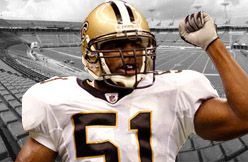Jun/18/12 08:16 AM Filed in:
Jonathan VilmaThe players suspended for their roles in the alleged Saints bounty program believe the proof against them is roughly as real as the chances they have at getting a fair appeal hearing on Monday.
“After what Jonathan [Vilma] and the other players have been put through, to suggest the players are being presented with any kind of fair hearing based on what has been presented today is pure fantasy,” lawyer Peter Ginsberg told Jim Varney of the New Orleans Times-Picayune. ”The thin production today doesn’t link any of the players to a bounty system, and that’s consistent with what we know to be true — there was no bounty system.”
Varney’s report regarding the contents of the evidence confirm everything reported by PFT on Friday. The league produced fewer than 200 pages of evidence that will be used at Monday’s quartet of appeal hearings, along with no list of witnesses to be called to provide raw evidence of bounties that could then be tested by the NFLPA and lawyers representing the individual players.
Also, the evidence to be presented by the NFL includes two items that didn’t even exist when the suspensions were implemented: a June 6 article written by Mike Triplett of the Times-Picayune and filmmaker Sean Pamphilon’s rambling 10,000-plus-word diary regarding the events leading up to and following his decision to release audio of former Saints defensive coordinator Gregg Williams’ comments recorded the day before a January 2012 playoff loss to the 49ers.
While it’s possible that, given Vilma’s pending defamation lawsuit against Commissioner Roger Goodell, the league has opted to keep in its back pocket for now any “smoking gun” evidence that would establish conclusively that Vilma offered $10,000 to anyone who knocked Brett Favre or Kurt Warner out of playoff games in January 2010, Ginsberg believes the league has chosen not to use any raw evidence of guilt at the Monday appeal hearings because it has no raw evidence of guilt.
“That’s because there are no credible witnesses who could substantiate the Commissioner’s allegations,” Ginsberg said.
And that’s ultimately what Goodell and the NFL need. If Vilma truly offered to pay $10,000 to anyone for injuries to be inflicted on Favre, Warner, or any other opponent, someone presumably heard Vilma say it. If the NFL doesn’t produce that person to testify at Monday’s hearing, how can Vilma ever obtain anything remotely resembling a fair opportunity to prove his innocence? Coupled with the league’s likely refusal to make available coaches who would have been in the room when Vilma said what he said — coaches who possibly would say “I never heard Vilma said that” — the process becomes a sham.
Instead of giving the players a chance to get to the truth, the league seems to be relying on the same “take our word for it” approach that has characterized its entire handling of the pay-for-performance/bounty scandal. It’s an approach that was launched the moment the league duped the media on March 2 into thinking there had to be conclusive proof of a bounty system, and that has lasted through each subsequent effort not to share evidence but to characterize and/or summarize it in a way that was skewed toward the league’s desire to hammer the Saints for using bounties, presumably to serve as the ultimate warning for any other players or coaches who may be tempted to use bounties in the future.
Though a truncated appeal hearing makes plenty of sense when there’s no dispute about what a player did and the only issue is the extent of his punishment, something far more detailed is necessary where, as in this case, the suspended players sharply disagree with the serious allegations made against them. For a league that is so concerned about public confidence in the integrity of the game, the NFL should at least be a little concerned about public confidence in the integrity of the league.

(profootballtalk.com)



